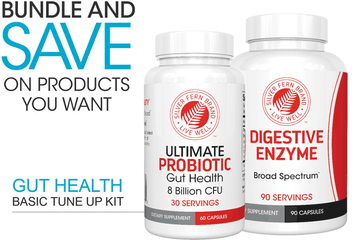
High-fat, low-carb diets are nothing new, but recently they’ve reclaimed their fame under a fresh, new name, The Ketogenic Diet. The vogue eating style rose to the spotlight after preliminary research suggested it could help shed body fat, clear up acne, elevate brain function and improve polycystic ovarian syndrome, among other things.
The basis behind these health benefits is rooted in the idea that by starving the body of carbs and sugar, you can force your metabolism into ketosis. This metabolic state forces the body to burn fat for energy, stabilizes blood glucose and may reduce inflammation. While there is research to support these claims, there are also dark truths about long-term adherence to the diet that require some attention.
Research shows that the Keto Diet and other eating styles that are high in saturated fat, have the following consequences on gut health:
1. May reduce gut microbial diversity.
Think of the diversity and richness like the legs of a table. The more diverse species you have in your gut, the more stable and functional the gut becomes. When we starve the gut of its preferred food source (i.e. fiber and carbohydrates) we essentially ‘chop off the legs of the table’ and destabilize our gut microbiome.
In a 6-month trial involving children with epilepsy, researchers discovered that while Keto Diets significantly improved incidence of seizures, this eating style also starkly reduced richness and diversity of the gut microbiome.1 Results from this study indicate that the Keto Diet can de-stabilize the gut by reducing microbial diversity.
2. Reduces butyrate production.
Butyrate is produced via microbial fermentation of fibers, but only certain members of the gut microbiome are capable of producing it. This molecule has powerful anti-inflammatory, anti-cancer and gut healing properties. Butyrate is like liquid gold to our gut mucosa and helps keep our gut barrier strong and healthy. A recent study found that following a ketogenic diet kills off butyrate producing species in the gut, such as Roseburia and Faecalibacterium.2 Without these species, butyrate production plummets causing a surge in gut inflammation which can exacerbate gut dysbiosis. Positively, research shows that enhancing butyrate can reduce high fat diet-induced dysbiosis, improve adiposity and reduce biomarkers of cardiovascular disease.3
3. Increases bile production which may lead to gut dysbiosis.
During digestion of dietary fats, the liver produces bile to break down lipid molecules into smaller particles that can be absorbed in the small intestine. But if we are going overboard on fat intake, we create a swell of bile production that eventually ends up in the gut. Bile is an alkaline substance, which lowers gut acidity.4 An acidic gut is important for proper digestion and to help fend off pathogens.
Many beneficial gut species are intolerant to bile, while pathogenic, inflammatory species are bile resistant. The mechanisms of fat digestion and bile production create an environment where unhealthy bacteria thrive while friendly microbes are killed off.4
4. Increases abundance of inflammatory gut species
High fat diets are known to shift gut microbiome composition, favoring an increase in Firmicutes and a decrease in Bacteroidetes. This type of gut microbe composition is associated with obesity and development of chronic diseases.5
A recent study found that a Keto Diet increases abundance of inflammatory gut species, such as E. coli. Such inflammatory species upregulate the production of cytokines such as IL-6, IFN-γ and others.6 These damaging molecules are implicated in several gut disorders such as colitis, IBS and even colon cancer.
5. Reduces gut barrier integrity/causes leaky gut syndrome
The gut mucosal layer is a physical barrier that prevents the inner contents of the gut from entering our blood stream. Research from the past several decades shows that high-fat diets shift microbial composition, causing butyrate production to plummet. Furthermore, saturated fats can induce oxidative stress and apoptosis of our precious gut mucosal cells.7 These processes ultimately lead to leaky gut syndrome, which refers to destruction of our gut barrier. When this happens, endotoxins from the gut are able to leak into our blood stream causing widespread, chronic inflammation. Long-term adherence to the Keto Diet can set you up for developing inflammatory diseases such as obesity, diabetes, cancer and central nervous system disorders.8
The Caveat
It should be noted that there are a limited number of clinical and animal trials which reveal conflicting outcomes of the Keto Diet.
For example, one study found that short-term adherence to a Keto Diet significantly reduced gut diversity, but after 12 weeks the gut microbiome returned to normal.9 This is contrary to numerous other reports that generally show a reduction in gut diversity without a return to baseline.10 The outcomes of the Keto Diet are dependent on the ratios of saturated to unsaturated fat in the diet, baseline gut microbial composition, intake of prebiotic fibers and other factors.10
A recent study found that people who consumed prebiotics and probiotics while following a ketogenic diet maintained a healthy gut microbiome. Furthermore, the addition of such supplements actually enhanced the beneficial effects of Keto Diets, such as weight loss.11
This research indicates that there are preventative measures you can take to avoid the negative consequences of the Keto Diet. So, if you are dead set on ‘going keto’, consider incorporating gut-healthy supplements into your Keto Diet routine.
How do prebiotics and probiotics protect against Keto Diet-induced gut changes?
Prebiotic fibers and polyphenols are nutrients which come from fruits, vegetables, whole grains and legumes. These foods are essentially off-limits on the Keto Diet, which is a major reason why this diet harms the gut microbiome. Luckily, these important prebiotic compounds can be extracted from plants and taken as dietary supplements without contributing to carbohydrate intake.
When we take prebiotics, our gut bacteria gobble them up in a process known as microbial fermentation. Short-chain fatty acids, or SCFAs, are produced as a metabolic byproduct of this process. Butyrate is one of the most important SCFAs which quells inflammation, supports immune health and protects the gut mucosal barrier.12 Taking prebiotics can therefore restore butyrate production in the gut, reduce gut inflammation and help heal the gut barrier.
Bacillus spores may off-set the negative effects of a Keto Diet
Bacillus spore-based probiotics are also shown to protect the gut from foods that are high in saturated fat. For example, a recent clinical trial found that 30-day supplementation with Bacillus spore-based probiotics significantly reduced biomarkers of leaky gut following a high fat meal by 60%.13 This was accompanied by a 24% reduction in serum triglycerides, and significantly lower levels of the inflammatory molecule known as IL-1β.
B. subtilis produces a large number of antimicrobial molecules that can lower abundance of proinflammatory species, such as E. coli and Salmonella.14 This mechanism brings microbial populations back into balance. Similarly, the probiotic species B. coagulans can be used to off-set the gut-alkalizing effects of high-fat diets. This species is a potent producer of lactic acid, which keeps the gut at a healthy pH and favors the growth of friendly gut bacteria. For example, research shows that B. coagulans treatment promotes the growth of butyrate-producing species, such as Faecalibacterium prausnitizii.15
Adding serum bovine immunoglobulins (SBI) to the mix can provide additional benefit. For example, a recent study found that a combination of Bacillus spore-based probiotics and SBIs reduced levels of TNFa by 29%, IL-6 by 16%, and improved biomarkers of leaky gut. SBI helps reduce some of the gut issues related to Keto Diet because it can bind to toxins in the gut and promote healing of the gut mucosal layer. This can reduce gut inflammation and lower the incidence of diarrhea.17
References
- Zhang Y, et al. Altered gut microbiome composition in children with refractory epilepsy after ketogenic diet. Epilepsy Res. 2018;145:163-168.
- Lindefeldt M, Eng A, Darban H, et al. The ketogenic diet influences taxonomic and functional composition of the gut microbiota in children with severe epilepsy. NPJ Biofilms Microbiomes. 2019;5(1):5.
- Gao F, Lv YW, Long J, et al. Butyrate Improves the Metabolic Disorder and Gut Microbiome Dysbiosis in Mice Induced by a High-Fat Diet. Front Pharmacol. 2019;10:1040.
- Molinero, et al. Intestinal Bacteria Interplay With Bile and Cholesterol Metabolism: Implications on Host Physiology. Front. Physiol. 2019; 10:185.
- Murphy EA, Velazquez KT, Herbert KM. Influence of high-fat diet on gut microbiota: a driving force for chronic disease risk. Curr Opin Clin Nutr Metab Care. 2015;18(5):515-520.
- Lindefeldt M, Eng A, Darban H, et al. The ketogenic diet influences taxonomic and functional composition of the gut microbiota in children with severe epilepsy. NPJ Biofilms Microbiomes. 2019;5(1):5.
- Murphy EA, Velazquez KT, Herbert KM. Influence of high-fat diet on gut microbiota: a driving force for chronic disease risk. Curr Opin Clin Nutr Metab Care. 2015;18(5):515-520.
- Rohr, et al. Negative Effects of a High-Fat Diet on Intestinal Permeability: A Review. Advances in Nutrition. 2020; 11(1): 77–91
- Paoli A, et al. Ketogenic Diet and Microbiota: Friends or Enemies?. Genes (Basel). 2019;10(7):534.
- Wan, et al. Effects of dietary fat on gut microbiota and faecal metabolites, and their relationship with cardiometabolic risk factors: a 6-month randomised controlled-feeding trial. Gut 2019;68:1417–1429.
- Gutiérrez-Repiso C, et al. Effect of Synbiotic Supplementation in a Very-Low-Calorie Ketogenic Diet on Weight Loss Achievement and Gut Microbiota: A Randomized Controlled Pilot Study. Mol Nutr Food Res. 2019;63(19):e1900167.
- Slavin J. Fiber and prebiotics: mechanisms and health benefits. Nutrients. 2013 Apr 22;5(4):1417-35. doi: 10.3390/nu5041417. PMID: 23609775; PMCID: PMC3705355.
- McFarlin BK, et al. Oral spore-based probiotic supplementation was associated with reduced incidence of post-prandial dietary endotoxin, triglycerides, and disease risk biomarkers. World J Gastrointest Pathophysiol. 2017; 8(3):117–126.
- Suva MA, et al. Novel insight on probiotic Bacillus subtilis: Mechanism of action and clinical applications. Jour Curr Res in Sci Med. 2016; 2(2):65-72.
- Dong T, Van P, Cutting S. Bacillus Probiotics. Nutra Foods. 2009;8(2):7-14.
- Catinean A, et al. Probiotic Bacillus Spores Together with Amino Acids and Immunoglobulins Exert Protective Effects on a Rat Model of Ulcerative Colitis. Nutrients. 2020;12(12): 3607.
- Shaw AL, Tomanelli A, Bradshaw TP, Petschow BW, Burnett BP. Impact of serum-derived bovine immunoglobulin/protein isolate therapy on irritable bowel syndrome and inflammatory bowel disease: a survey of patient perspective. Patient Prefer Adherence. 2017;11:1001-1007.




